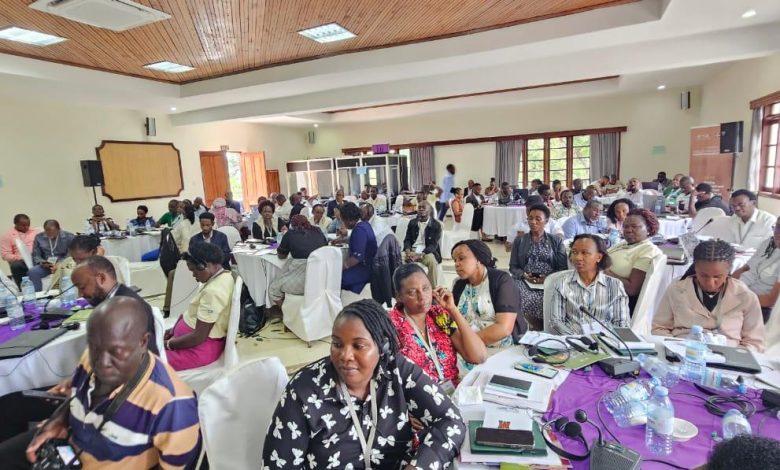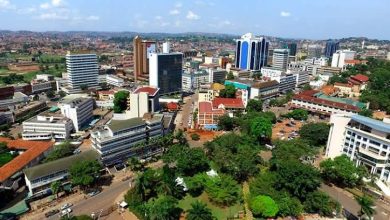EAC participants adopt resolutions to strengthen agroecology trade

The East African Community (EAC) has taken a significant step toward strengthening agroecological trade in the region.
Participants at the Regional Conference on Enhancing Cross-Border Trade in Agroecological Produce
concluded the week-long gathering in Jinja, Uganda, with seven comprehensive resolutions aimed at improving the sector and supporting economic growth across member states.
The conference brought together a diverse group of stakeholders, including government officials, private-sector representatives, farmers, researchers, civil society organizations, and journalists from Kenya, Uganda, Tanzania, Rwanda, South Sudan, Burundi, and the Democratic Republic of Congo (DRC).
The gathering provided a platform for stakeholders to exchange ideas, share experiences, and identify opportunities for collaboration in promoting agroecological trade.
Dr. Million Belay, General Coordinator of the Alliance for Food Sovereignty in Africa (AFSA), highlighted that approximately 100 participants engaged in intensive discussions throughout the conference. He emphasized the importance of collective action in advancing agroecology within the EAC region.
“We agreed that every stakeholder has a responsibility to ensure accelerated regional economic growth through agroecology. Governments, private sector actors, farmers, and civil society must implement commitments to eliminate non- tariff barriers (NTBs) and simplify customs procedures,” Dr Belay stated.
Addressing Trade Barriers and Market Infrastructure
A key focus of the conference was the need to improve market infrastructure for agroecological products. Participants resolved to establish designated areas at both
local and border markets to facilitate the trade of agroecological produce.
Additionally, the Participatory Guarantee Systems (PGS) were identified as critical mechanisms to ensure consumer trust in agroecological products.
This approach allows consumers to be confident in the authenticity and quality of products such as organic vegetables, fruits, and herbal products, while also promoting transparency within supply chains.
Infrastructure improvements also extend to storage and transportation. The resolutions recommend investment in cold storage facilities, transport networks, and supportive public infrastructure to ensure that products remain fresh and reach markets in optimal condition.
Strengthening infrastructure is expected to reduce post-harvest losses and improve efficiency in the distribution of agroecological produce across borders.
Capacity Building and Policy Alignment
Conference participants emphasized the need for capacity building for producer organizations, traders, and policymakers. Stakeholders agreed that training and education in collective marketing, advocacy, and business development are essential for the growth of the agroecological sector.
Farmers and traders will benefit from technical support to improve production practices, enhance product
quality, and access new markets. Financial inclusion was also highlighted as a critical component for supporting
cross-border trade.
The harmonization of regional currencies, the development of equitable digital financial systems, and access to financial services were identified as necessary steps to facilitate trade in agroecological products.
To ensure consistency and sustainability, the conference called for policy alignment across EAC member states. Governments were urged to integrate agroecological priorities into national agricultural, trade, and climate policies. Aligning policies with regional objectives will promote sustainable growth, encourage environmentally friendly production methods, and facilitate a smooth flow of trade across borders.
Dr. Belay further stressed the importance of budget prioritization to support agroecology. Investment in research, production, certification, and standards development is necessary to strengthen the sector and promote innovation.
Role of Civil Society and Research Institutions
Civil society organizations (CSOs) were recognized as key contributors to the promotion of agroecology.
Rachael Mohmoh, Program Coordinator from Trans Community Kenya, highlighted the importance of reviewing standards, strengthening border infrastructure, and supporting policymakers and traders in understanding the principles of agroecology.
Research institutions also have a role to play. Conference participants called on researchers to advocate for policy reforms, develop certification systems, and support initiatives that increase the recognition and traceability of agroecological products.
Integrating agroecology into educational curricula at all levels was emphasized as a strategy to raise awareness and build future capacity in sustainable agricultural practices.
Enhancing Cross-Border Trade Logistics
Cross-border trade logistics remain a significant challenge in the EAC. Mariam Babu, Chairperson of the Women Cross-Border Traders Association in Busia, Uganda, emphasized the need to remove barriers that delay the transport of agroecological products.
Participants recommended the introduction of specialized equipment at customs points, as well as improved coordination among border officials to ensure timely clearance of goods. Dr Sebastian Msapalla of Organic Moringa Herbal, Tanzania, highlighted the importance of establishing dedicated trade routes and specialized markets for agroecological products.
Regular regional meetings were proposed to strengthen cooperation, facilitate information exchange, and promote continuous awareness campaigns at border posts. These measures are expected to enhance the efficiency and reliability of agroecological trade across the EAC region.
Inclusive Participation and Gender Mainstreaming
The resolutions also emphasized the importance of inclusive participation in agroecological trade. Women, youth, and persons with disabilities were recognized as critical contributors to the sector. Stakeholders agreed to implement programs and initiatives that promote equal opportunities for these groups, ensuring that all
segments of society benefit from agroecological trade and contribute to sustainable economic growth.
Media Engagement and Public Awareness
Participants recognized the role of media engagement in promoting agroecological trade. The resolutions called for media outlets to utilize various platforms, including social media, to showcase success stories, increase visibility, and provide accurate information about agroecological products.
Specialized journalism on agroecology was recommended to enhance public understanding and encourage consumer support for sustainable agricultural practices.
Strengthening Farmer and Trader Capacity
Farmers and traders remain at the center of agroecological trade. Bayera Jane, a conference participant, highlighted the need for farmers to increase production and improve product quality. This approach aims to strengthen value chains, facilitate regional trade, and enhance market competitiveness.
Capacity-building initiatives targeting women and youth were emphasized to support inclusive economic growth and empower these groups to participate fully in agroecological trade. Collaboration with regional and border market leaders was also identified as a priority.
By working together, traders and farmers can improve market access, enhance product distribution, and ensure that agroecological products reach consumers efficiently and reliably.
Toward a Cohesive Strategy
The resolutions adopted at the Jinja conference represent a comprehensive strategy for promoting agroecological trade in the EAC. From production to policy, from farmers to traders, and from civil society to researchers, every stakeholder has a role to play.
With sustained investment, improved infrastructure, harmonized policies, and targeted awareness campaigns, the EAC is positioning itself as a model for sustainable, green, and inclusive cross-border trade.
The conference highlighted that promoting agroecology is not only an economic imperative but also a pathway to environmental sustainability and regional integration. By strengthening the trade of agroecological products, member states can support food security, enhance livelihoods, and foster a resilient and sustainable agricultural sector.
The week-long conference in Jinja served as a pivotal platform for advancing agroecological trade across East Africa. The seven resolutions adopted by participants provide a roadmap for enhancing collaboration, improving market access, and ensuring that agroecological products are produced, traded, and consumed sustainably.
The outcomes of the conference demonstrate the commitment of the EAC, its member states, and stakeholders to building a robust agroecological sector. By implementing these resolutions, the region can strengthen its position as a leader in sustainable agriculture and inclusive trade, ultimately contributing to economic growth, environmental protection, and social well-being across East Africa.





